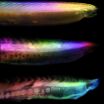(Press-News.org) Researchers at the University of California, San Diego School of Medicine, led by Larry R. Squire, PhD, professor of psychiatry, psychology and neurosciences at UC San Diego and a scientist at the VA San Diego Healthcare System, report that working memory of relational information – where an object is located, for example – remains intact even if key brain structures like the hippocampus are damaged.
The findings, published in the October 13, 2010 issue of The Journal of Neuroscience, run contrary to previous research that suggested spatial information, especially if it's linked to other kinds of information, necessarily involves the hippocampus and other regions associated with memory.
Working memory is the mental ability to hold small amounts of information in an active, readily available state for a short period of time, typically a few seconds. Conversely, long-term memory involves storing a potentially unlimited amount of information for an indefinite period of time.
Squire and colleagues examined four memory-impaired patients with damage to their medial temporal lobes (MTL), a region of the cerebral cortex containing the hippocampus and linked to long-term memory formation.
The four patients were asked to briefly study an arrangement of objects on a table, then reproduce the objects' relative positions on another table. When the number of objects was three or less, the patients' ability to recall was similar to that of control subjects without brain damage. The impaired patients easily remembered where the objects had been placed in relation to each other.
But "their performance abruptly collapsed when the limit of working memory was reached," said Squire. The patients could not remember the locations of four or more objects because doing so involved tapping into long-term memory functions in the medial temporal lobe.
"The findings provide strong evidence for a fundamental distinction in the brain between working memory and long-term memory, even in the realm of spatial information and spatial-object associations," Squire said.
The work has practical and clinical significance as well, according to Squire.
"It indicates that patients with memory impairment due to MTL damage, including early stage Alzheimer's disease, have a narrower difficulty than what one might have thought. They have an intact ability to hold information in mind, and an ability to work with it on a temporary basis."
###Co-authors of the paper are Annette Jeneson of the UCSD Department of Psychology, and Kristin N. Mauldin of the UCSD Department of Psychiatry.
END
SALT LAKE CITY—University of Utah (U of U) medical researchers have made an important step in diagnosing autism through using MRI, an advance that eventually could help health care providers indentify the problem much earlier in children and lead to improved treatment and outcomes for those with the disorder.
In a study published on October 15, 2010 in Cerebral Cortex online, researchers led by neuroradiologist Jeffery S. Anderson, M.D., Ph.D., U of U assistant professor of radiology, used MRI to identify areas where the left and right hemispheres of the brains of people ...
Some tiny crustaceans living in clear-water alpine ponds high in Washington state's Olympic Mountains have learned how to cope with the sun's damaging ultraviolet rays without sunblock – and with very little natural pigmentation to protect them.
In fact, in laboratory tests these water fleas, about the size of fruit flies, withstood UV rays much better than the same species of flea taken from a pond less than a mile away, where the water was murkier and thus offered protection.
"The ponds pretty much look the same to us, but the environments are very different for ...
PHILADELPHIA (October 12, 2010)—In an unexpected twist, Fox Chase Cancer Center researchers find that the loss of a single protein, Nedd9, initially slows cancer formation but then makes the tumors that do arise more aggressive. The good news, though, is that the lack of Nedd9 also makes the aggressive tumors more sensitive to a class of drugs that are already used in the clinic.
"If a tumor is able to overcome the loss of this protein, this clearly makes it undergo complicated changes that ultimately select for a more aggressive tumor," says Erica A. Golemis, Ph.D., ...
Researchers at the University of Edinburgh today report a new experimental compound that can improve memory and cognitive function in ageing mice. The compound is being investigated with a view to developing a drug that could slow the natural decline in memory associated with ageing.
With support from a Wellcome Trust Seeding Drug Discovery award, the team has identified a preclinical candidate that they hope to take into human trials within a year.
Many people find they become more forgetful as they get older and we generally accept it as a natural part of the ageing ...
The drug reboxetine is, overall, an ineffective and potentially harmful antidepressant, according to a comprehensive study of the evidence published on bmj.com today.
The study also shows that nearly three quarters of the data on patients who took part in trials of reboxetine were not published until now, and that the published data on the drug overestimate the benefits and underestimate the harms of treatment - all underlining the urgent need for mandatory publication of all clinical trial results.
Reboxetine has been approved for the treatment of major depressive ...
To assess the performance of general practices, it is better to ask patients about their actual experiences of care rather than ask for satisfaction ratings, according to new research published on bmj.com today.
The findings call into question the reliability of using surveys to evaluate practice performance.
Patient surveys are used to assess the performance of doctors and practices, and they increasingly enquire about specific patient experiences (e.g. waiting time for an appointment) as well as overall satisfaction.
In the UK, general practices receive some of ...
In a Canadian first, the Peter Munk Cardiac Centre used a new kind of left ventricular assist device (LVAD) to treat a patient with advanced heart failure. The new device is longer lasting than older generation LVADs and may eliminate the need for a second LVAD – a major drawback with the old technology.
The patient, 61-year-old Marva Lorde of Mississauga, suffered a heart attack in 2007 and underwent several treatments for heart failure – including a 10-day intensive care unit stay, angioplasty and pacemaker implantation –culminating in a cardiac arrest in June 2008.
"I ...
With Halloween and the holiday season fast approaching, many people will be watching their waistlines as they're tempted by a cornucopia of sugary and savory foods. Meanwhile a Georgia Tech College of Computing Ph.D. candidate has shown that playing health-related video games on a mobile device can help adults learn to live more healthfully by making smart diet choices. The finding is published in the paper, "Let's Play! Mobile Health Games for Adults," recently presented at Ubicomp 2010 in Copenhagen, Denmark.
OrderUP! is a different take on the recent trend of health-related ...
An innovative experiment at the University of Leicester that involved studying rotting fish has helped to create a clearer picture of what our early ancestors would have looked like.
The scientists wanted to examine the decaying process in order to understand the decomposition of soft-body parts in fish. This in turn will help them reconstruct an image of creatures that existed 500 million years ago.
Their findings have been published today, Wednesday 13th October, in the journal Proceedings of the Royal Society B. The work was funded by the Natural Environment Research ...
Eating steamed pears, having a soothing massage or bathing in a herbal mixture are just some of indigenous health practices used by older people to ward off or treat influenza, according to research published in the October issue of the Journal of Advanced Nursing.
Other traditional measures discovered by nurse researchers at the Hong Kong Polytechnic University included being rubbed with a coin, eating cheese, yoghurt and honey and having warm drinks made with ginger or lemon.
The team surveyed nine countries to find out why so many of them were failing to meet the ...


